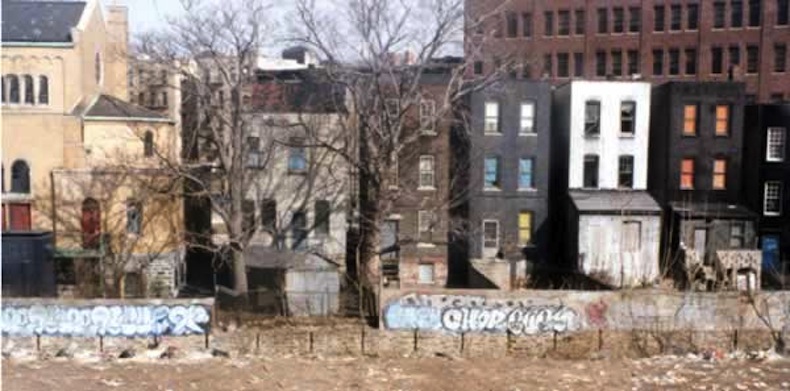The Road to Relocation
Building a new home in a run-down neighborhood in Atlanta was a decision that neither of our parents supported. It was a bad financial move, they counseled us, not to mention the danger. But my wife Peggy and I were not relocating into the inner-city for economic reasons. We had finally come to the conclusion that our ministry would be more effective if we lived among the people we felt called to serve than continue to commute from the suburbs. And so we graciously thanked our parents for their love and concern and went ahead with our construction plans.
New construction in the neighborhood was unheard of – at least for the past 50 years – and so the activity attracted much local attention. And some unexpected attention from outside real estate developers, as well. Within a few months of moving into our new home we were delighted to see four new homes go up just two blocks from us, as well as a good number of renovations beginning throughout the neighborhood. Our property value was going to increase after all!
But during prayer and sharing times at our neighborhood church we began to hear prayer requests for housing needs. “Please pray for us – our rents have just doubled.†“Please pray for us – we’ve just gotten an eviction notice.†It wasn’t until Opal, a church member who lived within sight of the church, came in weeping one morning that I first made a disturbing connection. She had just received an eviction notice from the home she had lived in for many years – the city told the landlord to fix it up or board it up and he had decided to board it up until property values made it attractive to sell. For the first time it dawned on me that as my property value was nicely increasing, so was the value of the surrounding affordable homes.
As my wealth was accumulating, Opal’s poverty was deepening. It was my investment that was the catalyst for her displacement. I could no longer sit in the circle and pray with integrity.
I was the problem!
What is Gentrification?
There was a name for this dilemma, I soon learned: Gentrification. It comes from the old English word gentry, the land-rich ruling class of the 16th century who controlled the economy by virtue of their land holdings. “Landlords†they were literally, the rulers of all who lived as serfs on their vast estates. They eventually disappeared from the social landscape with the emergence of the industrial revolution as wealth shifted away from the land and to the factories in burgeoning cities. The term gentry has been resurrected in our generation to describe the return of landowners to the city. I discovered that I was one of them. And it was not a complement.
Gentrification by contemporary definition is “the restoration and upgrading of deteriorated urban property by the middle classes, often resulting in displacement of lower-income people.” It is a new national norm. Over the past 50 years American cities have declined as the suburbs blossomed. This pattern is quite different from most of the large cities of the world where wealth and power are concentrated at the center and poverty spreads outward toward the outlying and less developed outskirts.
In developing nations, people migrate from the rural areas, settle in poorer edge cities (or sometimes shantytowns outside the city) and try to work their way toward the prosperous center. U.S cities, on the other hand, are like donuts with a hole in the middle and the dough around the outside. Our center cities are where our poverty is concentrated.
But all this is changing. A massive demographic shift has begun, a great reversal as wealth returns to the inner core and poverty is pushed to the periphery. U.S. cities are beginning to conform to the pattern of most world cities, and in the process a Diaspora – an uprooting and scattering – of the poor has begun.
**************************
This is Part 1 of a 6-part series on community development, justice and gentrification by Bob Lupton. Stay tuned to Verge Network every Friday for the remaining parts of this series of articles.Â
Bob Lupton has invested almost 40 years of his life in inner-city Atlanta. In response to a call that he first felt while serving in Vietnam, he left a budding business career to work with delinquent urban youth. Bob and his wife Peggy and their two sons sold their suburban home and moved into the inner-city where they have lived and served as neighbors among those in need. Their life’s work has been the rebuilding of urban neighborhoods where families can flourish and children can grow into healthy adults.
Bob is a Christian community developer, an entrepreneur who brings together communities of resource with communities of need. Through FCS Urban Ministries – a non-profit organization which he founded – he has developed two mixed income subdivisions, organized a multi-racial congregation, started a number of businesses, created housing for hundreds of families and initiated a wide range of human services in his community. He is the author of the books Theirs in the Kingdom, Return Flight, Renewing the City, Compassion, Justice and the Christian Life and the widely circulated “Urban Perspectivesâ€, monthly reflections on the Gospel and the poor. Bob has a Ph.D. in psychology from the University of Georgia. He serves as speaker, strategist, and inspirer with those throughout the nation who seek to establish God’s Shalom in the city.



